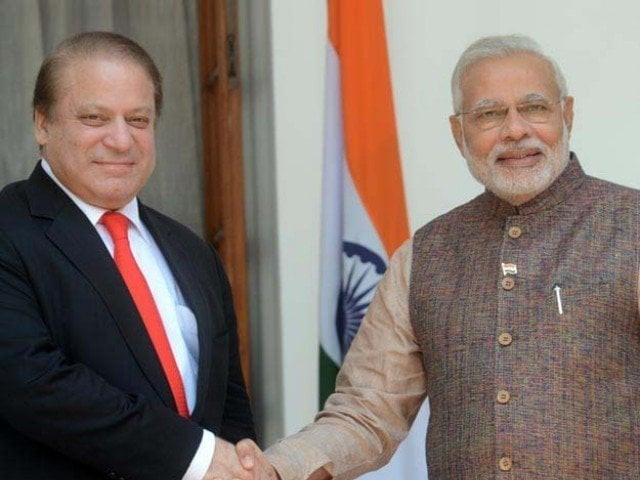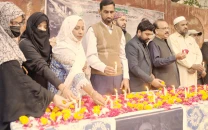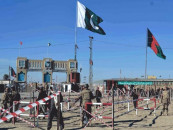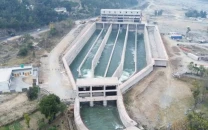Civil-military huddle decides to reach out to New Delhi, Kabul
Rapprochement with Afghanistan already under way

Prime Minister Nawaz Sharif with his Indian counterpart Narendar Modi. PHOTO: AFP
The decision to reach out to both Kabul and New Delhi with fresh proposals for resolving differences through dialogue was taken at a high-level civil-military huddle.
Indian army won’t shy away from flexing muscles on border: chief
The meeting, chaired by Prime Minister Nawaz Sharif, was attended by army chief General Qamar Javed Bajwa, Inter-Services Intelligence (ISI) Director General Lt Gen Naveed Mukhtar, Prime Minister’s Adviser on Foreign Affairs Sartaj Aziz, Interior Minister Chaudhry Nisar, Finance Minister Ishaq Dar and National Security Adviser Lt Gen (retd) Nasser Khan Janjua. This was the first security meeting since the change of command in the army as well as the country’s top spy agency.
The move to make a pitch for talks with Afghanistan and India came at a time when Pakistan’s relationships with its eastern and western neighbours have been strained because of a trust deficit and longstanding disputes.
The process of rapprochement with Afghanistan already began when the army chief telephoned the top political and military leadership of Afghanistan during the weekend, pledging to work for the peace in the region.
Sources familiar with the high-level huddle at the prime minister’s office told The Express Tribune that Gen Qamar briefed the meeting about his telephone conversation with Afghanistan’s President Ashraf Ghani and Chief Executive Abdullah Abdullah as well as chief of the neighbouring country’s army.
Gen Qamar, who was invited by President Ghani to visit Kabul, will soon travel to the Afghan capital in a bid to convince the administration there to take a fresh start for the moribund Afghan peace process. His predecessor Gen Raheel Sharif also made a promising start when he took over as the army chief as the Afghan government threw its weight behind Pakistan’s efforts to bring the Taliban to the negotiating table.
Gen Raheel’s efforts eventually resulted in the first-ever direct talks between the Afghan government and Taliban representatives in Murree in 2015. The process, however, could not move forward after Afghan intelligence deliberately leaked news of the death of Mullah Omar. The move was a serious blow to the fragile peace process with Pakistan questioning its sincerity.
Can’t rule out more ‘surgical strikes’ against Pakistan: Indian Army chief
Despite the trust deficit, Pakistan and Afghanistan also joined by China and the US agreed to revive the peace process in December 2015. But as another round of talks was being planned, US killed Mullah Omar’s successor Mullah Mansoor in a drone strike in Balochistan, shattering any hopes for furthering peace talks.
Afghanistan has since been accusing Pakistan of harbouring the Taliban and demanding use of force against the insurgents since they refused to enter into the negotiations. Pakistan, however, strongly denies the allegations and has emphasised the need for finding a political solution to the long running conflict.
Pakistan’s stance was vindicated last month when China and Russia also threw their weight behind Pakistan’s push for Afghan peace deal. This apparently put pressure on the Ghani administration, which is now willing to talk to the new Pakistani army chief to find a way out of the current impasse.
Tuesday’s meeting also deliberated the current stalemate with India. Relations between the two countries have been on a downward spiral especially after attack on the Indian military headquarters in Indian Occupied Kashmir in September. The troops from the two sides have since been regularly exchanging fire along the Line of Control and working boundary leaving scores dead on both sides of the border.
However, since the new army chief took charge in Pakistan, there is dramatic reduction in the violence along the LoC.
A senior military official dismissed the perception that the de-escalation was due to the change of command. “It is merely a coincidence,” the official insisted.
Independent observers, however, are of the view that India may be assessing the situation in view of the appointment of new army chief.
Sources said the government decided to reach out to India with a renewed offer of dialogue. It is not clear whether India will be approached through diplomatic channels or conveyed the message using the mechanism of national security advisers, who interact with each other away from the media glare.
Published in The Express Tribune, January 4th, 2017.



















COMMENTS
Comments are moderated and generally will be posted if they are on-topic and not abusive.
For more information, please see our Comments FAQ